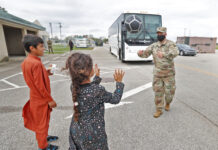QAYARA, Iraq — Nearly a dozen buses carrying 100 Iraqi families who lived in a sprawling Syrian camp for supporters and families of Islamic State militants returned to Iraq on Tuesday, where public opinion is divided about their return.
The families include women, children and men, according to Syrian Kurdish and Iraqi officials familiar with the repatriation plans.
Iraqi security officials in Ninevah confirmed the buses had entered the province and would be going to Jadah camp, near the town of Qayara. The officials declined to be named because the repatriation has not yet been made public.
The buses were accompanied by a huge convoy of Iraqi security forces, including the army, the federal police and the Popular Mobilization Forces.
The families have been living in al-Hol camp in northeastern Syria since early 2019 following the military defeat of the extremist group in which it lost the last territory it held.
The repatriation is one of the issues discussed between Iraqi and U.S. officials and has been delayed before amid opposition from Iraqi officials out of security concerns.
Al-Hol camp is home to nearly 70,000 people — most of them women and children — who were displaced by the military offensive of the U.S.-led coalition against IS. Nearly half of those living in the sprawling camp were Iraqis, facing dire living and security conditions.
About 10,000 foreigners are housed in a secure annex in the camp, and many remain die-hard supporters of IS.
This has made repatriation of the Iraqis and many of the foreigners a contentious issue. Despite calls from the Kurdish-led administration in northeastern Syria for repatriation, many countries have declined to take their nationals back. That’s either because they have no legal recourse for how to handle former Islamic State members or out of fear of their continued link with the militant group.
Aid groups have described dire conditions in the camp, where killings have been on the rise. They are believed to be carried out by IS supporters as punishment for perceived enemies or violators of the militant group’s policies.
Syrian Kurdish officials have struggled to keep the camp under control.
Tuesday’s transfer has been months in the making with many failed previous attempts. Rejection by officials and residents in Ninevah province, where the Jadah camp is located, has been the principal cause for delays.
“This decision will impact the community, people are very afraid,” said Saadoun al-Zaal, an activist living in the nearby town of Qayara, less than a kilometer (mile) from the camp. “There have been no assurances from the local or central governments, not even from the local administration of this district.”
“The camp (Jadah) is unfit because security is absent,” he added. “Danger will surround al-Qayara.”
In Iraq, the transfer is handled by the National Security Agency, not the Ministry for Migration, because of the returnees’ IS affiliation.
Plans were forged to bring the 100 families to Jadah camp in the first week of May but were derailed after local authorities and the Ninevah Joint Operations Command, which includes an array of security forces in the province, protested.
Yazidis also protested the return of the families, saying they would pass through their territories in Sinjar and remain in close proximity, raising fears among the traumatized community that is still missing over 6,000 of their people.
An Iraqi official said the objection was primarily because the Jadah camp, home to nearly 8,000 residents, was not equipped to absorb newcomers and was too close to a military base in Qayara. Another objection was that the returnees were from another province, Anbar.
“Local authorities in Ninevah asked ’why should we host these sensitive families who might cause us problems,” said the official, who spoke on condition of anonymity. Locals feared retaliatory killings and other security threats against the families.
The transfer was postponed until Tuesday to give the government time to find an alternative solution. It was not clear what, if any, arrangements have been made to placate local concerns.
Last February, tribal leaders in the rural areas of Zummar and Rabia in Ninevah blocked entry to a newly established camp, referred to as Amala, built primarily to house al-Hol families. The camp, which is 90% complete, according to Ninevah Gov. Najm al-Jibouri, lies vacant.
Kullab reported from Baghdad. Associated Press writer Sarah El Deeb contributed from Beirut.



